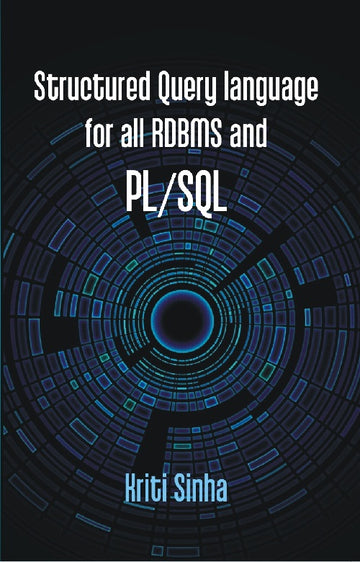Structured Query Language For All Rdbms and Pl/Sql
Regular price
₹ 419
Sale price
₹ 419
Regular price
₹ 450
Unit price
Save 7%
| Item Weight | 400 Grams |
| ISBN | 978-9351282013 |
| Author | Kriti Sinha |
| Language | English |
| Publisher | Kalpaz Publications |
| Pages | 320 p |
| Book Type | Paperback |
| Dimensions | 25 X 15 X 5 |
| Publishing year | 2016 |
| Edition | 1st |
| Return Policy | 5 days Return and Exchange |

Structured Query Language For All Rdbms and Pl/Sql
Product description
Shipping & Return
Offers & Coupons
ABOUT THE BOOK:- Structured Query language for all RDBMS and PL/SQL (SQL, PL/SQL) book is in-depth treatment of the SQL language for both technical and non-technical users, programmers, IT Professionals or engineering students, who wants to do Oracle certification and want to understand the impact of SQL in computer market. This book offers a conceptual framework for understanding of PL/SQL. It will show you, step-by-step, how to use SQL and PL/SQL features, with many illustrations and realistic examples to clarify SQL and PL/SQL concepts. The book also compares SQL products from leading RDBMS vendors describing their advantages, benefits to help you select the right query (SQL Statement) for your application. So user can try them for themselves and gain actual experience in using major database products like Oracle, Microsoft SQL Server, My SQL, SQLLite, and MS Access. It has a chapter on “some important questions and answers” which will really help users to increase their knowledge and implement on Data base and also to face interviews. It has also a chapter on “Practice Set doing Oracle certification “which will really help user to increase their knowledge to do Oracle certification. ABOUT THE AUTHOR:- Kriti Sinha is an Oracle certified DBA and IT Professional with 8+ years of work experience on Oracle, Microsoft SQL server and PL/SQL along with over 10 + years of experience in Teaching and training to IT professionals for SQL and PL/SQL. She is having Masters of Computer Application along with Oracle Certification for DBA and advanced PL/SQL programming. She is working on database SQL Server and Oracle since last 14 years". She likes reading books and keeps herself busy. CONTENTS:- Acknowledgment and Dedications 11 Chapter 1- Introduction of RDBMS What is RDBMS? 13 1.1 RDBMS 1.2 Table 1.2.1 Max limit for number of column for single table 1.2.2 Properties of the Relational Tables 1.3 Field 1.4 Rows 1.5 Column Chapter 2- Normalization 17 2.1 Types of Normalization 2.1.1 First Normalization form 2.1.2 Second Normalization 2.1.3 Third Normalization 2.1.4 Boyce Codd Normal form 2.2 Benefit Of normalization 2.3 Drawbacks of Normalization 2.4 Relational Types Chapter 3- Introduction of Structured Query Language (SQL) 27 3.1 SQL revisions 3.2 SQL Process 3.3 Type of SQL 3.3.1 Data definition language 3.3.2 Data Manipulation language 3.3.3 Data control language 3.3.4 Transaction Control Language 3.3.5 Data Query Language Chapter 4- Data Types for Various RDBMS 33 4.1 Microsoft Access Data Types 4.2 MY SQL data Types 4.3 SQL server Data Types 4.4 Oracle Data Types Chapter 5- Data Definition Language 45 5.1 Create Table, 5.1.1 Syntax for My SQL 5.1.2 Syntax for SQL Server 5.1.3 Syntax for Microsoft Access 5.1.4 Syntax for Oracle 5.1.5 Creating table from an existing table 5.2 Alter 5.2.1 Alter Table, Column, Data Type and constraints 5.3 Drop 5.3.1 Drop table 5.3.2 Drop a Default constraint 5.4 Truncate Chapter 6- Integrity Constraints 59 6.1 Types of Integrity Constraints 6.2 Default Constraints Chapter 7- Data Manipulation Language 65 7.1 Insert 7.1.1 Insert Into 7.1.2 Insert Data only in specific Columns 7.1.3 Insert into remote data base 7.2 Update 7.3 Delete 7.3.1 Delete specific Data 7.3.2 Delete all data 7.3.3 Modifier for My SQL Delete statement 7.4 Merge Chapter 8- Synonymous 77 8.1 Types of synonyms Chapter 9- Data Control Language 81 9.1 Grant and Revoke. Chapter 10- Transaction Control Language 85 10.1 commit 10.2 Savepoint 10.3 Rollback Chapter 11- Data Query Language 89 11.1 Select 11.2 Order by 11.3 Group By 11.4 Having 11.5 Subquery 11.6 Subqueries with the insert statement 11.7 Subqueries with the Update statement 11.8 Subqueries with the Delete statement 11.9 Subqueries with EXISTS and NOT EXISTS 11.10 Correlated Sub Query Chapter 12- Functions 113 12.1 Aggregate functions 12.2 Built-In scalar functions 12.3 Numeric Functions 12.4 EXTRACT Function 12.5 MY SQL Date Parts Functions 12.6 String Functions 12.7 Vacuum 12.8 Rank 12.9 Dense Rank 12.10 ROW Number 12.11 NULL functions 12.12 Server Supported Functions 12.11.1 Microsoft SQL Server- Server Supported Functions 12.11.2 MY SQL - Server Supported Functions 12.11.3 Oracle Server- Server Supported Functions Chapter 13- Joins 157 13.1 Join Conditions 13.2 Types of Join 13.2.1 Inner Join 13.2.1.1 Equi Join 13.2.1.2 Natural Join 13.2.1.3 Cross Join 13.2.2 Outer Join 13.2.2.1 Left Outer Join 13.2.2.2 Right Outer Join 13.2.2.3 Full Outer Join 13.2.3 Self Join 13.2.4 Anti Join 13.2.5 Semi Join Chapter 14- Wild Cards Character 183 14.1 SQL supported wildcard operators in conjunction with the LIKE operator Chapter 15- Operators 187 15.1 Unary 15.2 Arithmetic Operators 15.3 Concatenation Operator 15.4 Combining AND & OR 15.5 Distinct Chapter 16- Aliases & Dot Notation 195 Chapter 17- Conditional (CASE) Expressions 199 17.1 Searched CASE expression 17.2 Select statement with CASE expression 17.3 Update Statement with CASE expression 17.4 ORDER BY clause with CASE expression 17.5 Having Clause with CASE expression 17.6 DECODE Chapter 18- View 205 18.1 View-Some Important point to keep in mind while creating view 18.2 Types of View 18.2.1 Read only View 18.2.2 Updateable View 18.3 SQL Dropping View 18.4 materialized View 18.4.1 Types of Materialized View Chapter 19- Introduction of PL/SQL 215 19.1Data Types 19.2 Variables or Scalar Variable 19.3 Constants 19.4 Operators 19.5 Conditions 19.6 Loops statement 19.6.1 Simple LOOP 19.6.2 FOR LOOP 19.6.3 REVERSE LOOP 19.6.4 WHILE LOOP Chapter 20- Stored Procedures 221 20.1 Parameters Modes 20.1.1 Parameter IN 20.1.2 Parameter OUT 20.1.3 Parameter IN OUT 20.2 Drop Stored Procedure Chapter 21- Cursor 231 21.1 Types of Cursors 21.1.1 IMPLICIT Cursor 21.1.2 EXPLICIT Cursor 21.2 Attributes of cursor 21.3 Cursor Declaration, Opening, Fetching and closing Chapter 22- Function 235 22.1 Function creation 22.2 Calling function 22.3 Dropping Function Chapter 23- Trigger 237 23.1 Types of Trigger 23.1.1 Statement level Trigger 23.1.2 Row level Trigger 23.1.3 Column level Trigger 23.1.4 For each Row Type Trigger 23.1.5 For each statement level Trigger 23.2 Triggering a Trigger Chapter 24- Collections 241 24.1 Types of Collections 24.1.1 Nested Table 24.1.2 Variables-Size Array or VArray 24.1.3 Index By tables/Associative Array 24.2 Collection Methods 24.2.1 FIRST and LAST 24.2.2 EXISTS 24.2.3 COUNT 24.2.4 LIMIT 24.2.5 EXTEND 24.2.6 TRIM 24.2.7 DELETE Chapter 25- Exceptions 251 25.1 Syntax of Exception handing 25.2 Raising Exceptions 25.3 User Defined Exception 25.4 Pre-Defined Exceptions Chapter 26- Packages 255 26.1 Advantages of package 26.2 Package specification 26.3 Package body 26.4 Using Package elements Chapter 27- DBMS-Output 259 27.1 DBMS_OUTPUT Subprograms Chapter 28- Practice set for Oracle Certification 261 Chapter 29- Some Important questions and answers for SQL and PL/SQL 287 Chapter 30- Glossary 309 The Title 'Structured Query Language For All Rdbms and Pl/Sql written/authored/edited by Kriti Sinha', published in the year 2016. The ISBN 9789351282013 is assigned to the Paperback version of this title. This book has total of pp. 320 (Pages). The publisher of this title is Kalpaz Publications. This Book is in English. The subject of this book is Database / Computer & Technology / Information Technology. Size of the book is 13.34 x 21.59 cms Vol:-
- Sabr– Your order is usually dispatched within 24 hours of placing the order.
- Raftaar– We offer express delivery, typically arriving in 2-5 days. Please keep your phone reachable.
- Sukoon– Easy returns and replacements within 5 days.
- Dastoor– COD and shipping charges may apply to certain items.
Use code FIRSTORDER to get 5% off your first order.
You can also Earn up to 10% Cashback with POP Coins and redeem it in your future orders.








